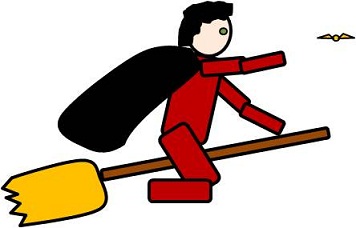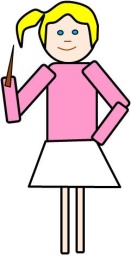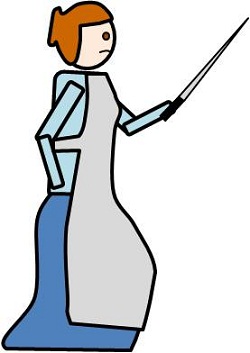THE TAKE AWAY
What's the Deal With: Twilight, Harry Potter and Whedon?
By Kersley Fitzgerald
What's the deal with…
JT was watching the original Star Wars last night (AKA: A New Hope; AKA: #IV) and the scene in the cantina with Han and Greedo came up. I went to Facebook and typed in one of Greedo's lines. My brother and sister immediately responded with following lines. Our old friend said, "Huh?"
That's the way it is with us sci fi/fantasy types. We get a little fanatical with our series. I have a theory about that—both the love of series and the love of quirky aspects in the series: it builds community. When Jen at Cake Wrecks makes an obscure reference to a sci fi movie, it gives validation to those who understand what she means. (And if you know what Cake Wrecks is, you just got a little taste of that.) If I see a bumper sticker that says "My other car is the Millennium Falcon" or a shirt that says, "I'm a leaf on the wind," I understand I'm with fellow Star Wars and Firefly fans. As some say, "I'm with my tribe."
That's part of what draws many fans into popular series. They can identify with others who understand. Christians do the same thing, of course, and can be even more fanatical. Here's some thoughts on some of the big series.
Harry Potter

In reality, that feeling of belonging should come from the church. The church is the real-life place of community, where everyone has a vital role to play that helps all the others. Or, it's supposed to be. Then again, there's a difference between Harry fighting off a hundred-foot long snake and JT collecting communion cups. Still, Harry's development into a powerful wizard mirrors the Christian walk, in some ways. A kid has to wade through lies and misunderstandings and things hidden "for his own protection" before he can come to the truth about reality and himself. Similarly, Harry doesn't know at the beginning of Book 1 how big the adventure is and how much will be expected of him.
Should Christians read Harry Potter? That's a personal discernment issue. 1 Corinthians 8 is a good place to start. Romans 14 is another.
Joss Whedon

Buffy was originally a movie about a teenage girl who discovers she has been chosen to slay the vampires in and around her LA high school. With the help of a semi-mysterious mentor and an outcast love interest, she manages to take out the local vampire hive. The movie was kitschy and cute, but the TV series was where Buffy and Joss really shone. Buffy is joined by more friends as well as a series of misfit super-natural beings including a vampire with a soul, a werewolf, and a former demon. Angel, a spin-off about the aforementioned vampire-with-a-soul launched mid-way through Buffy's run.
Joss is an absolutely amazing writer. His dialogue is creative. His ability to write for an ensemble is coveted by writers everywhere. Where Buffy lost me was when it got into the darker super-natural. I could handle Harry Potter and his buddy Ron waving wands around and throwing pillows across the room, but I had a problem with Willow, Buffy's best friend, becoming a real toil and trouble witch. I also have a problem with popular culture using demons as characters and plot devices—even though it's done in many Christian suspense novels. So, despite episodes like the critically acclaimed "The Body," I couldn't stick with it.
Which is why I was ecstatic when I heard Joss Whedon was coming out with a space western. In the truncated single season of Firefly, we meet the crew of a free-lance cargo space ship, five-hundred years in the future. The captain and first mate are veterans of a civil war that went badly for the rebels. The passengers include a preacher, a sort of geisha, a doctor, and the doctor's disturbed sister. For reasons beyond the understanding of the fanbase, the show was cut off before the first season had finished. The story line was resolved in the movie Serenity, where we learn the doctor's sister is a psychic combat prodigy who inadvertently learned of the origin of the ultra-violent zombie-like Reavers.
And if you've never heard of Firefly, I think I've just lost any chance of convincing you to watch it. Again, the strengths were in the world-building, the dialogue, and the character development. Both Buffy and Firefly invite the viewer in to the protagonists' world. The dialogue is unique enough that loyal watchers even adopt the vocabulary. (If you've ever heard anyone say, "Shiny!" as a response to a good thing, that's from Firefly.)
Should you watch them? With discretion, as in all things. Shepherd Book, the preacher played by Ron Glass in Firefly, was nicely written; a gracious, supporting Bible-reader who was good in a fight but wouldn't cross the line. All the swearing is in Chinese. Themes such as loyalty, love, and good against evil abound. Which is probably why the shows are such a big deal—viewers wish for the same kind of loyalty and love as they struggle against the evil in the world.
The Horrorizing of Jane Austen

I'm afraid I haven't read any others. Not Sense and Sensibility and Seamonsters or Jane Slayre, Charlotte Bronte's contribution. I honestly did come up with a chapter overview of Little Vampire Women, but, alas, someone beat me to the finished novel. I think I'll try out Android Karenina next. Because, really, all Tolstoy is missing is robots.
Twilight
What can I say about Twilight? Maybe some quotes would help:
"Twilight is just a cheesy teen vampire romance series that you hate to admit reading/watching." Chris, 41, mother of two, speech therapist.
"Twilight is dumb." Kelsi, 15, honors student, school paper editor; (so she had to read all of them to make sure they were "dumb" throughout).
"Decent action, weak everything else." Sarah, 29, writer, hater of peas.
"I can't make Bible study next Friday. I have to stand in line to see the premier of New Moon." Ev, 30, mother of two, paranormal romance writer.
This is the series that started the whole little line of posts. "How do I convince my grandkids not to read Twilight?" the man asked. Well, I said. In order to argue against something, it's best to find out something about it.
Twilight is about a woman who was sitting at home with her kids and created a character she could easily fall in love with, and then wrote a four-novel love letter to him. I mean, Twilight is about a girl who moves from Arizona to the Olympic Peninsula of Washington and falls in love with a vampire. I haven't read a lot of romances, but I imagine they're like this—a few scenes of sexual tension in between some plot stuff. The thing I remembered most about Twilight (Yes, I read them. I was researching for a book—kind of Northanger Abbey meets the current vampire craze.) was that once I finished a book, I couldn't remember anything about it. It was like cotton candy. Sweet and addictive going down, but strangely unfulfilling in retrospect.
Which is obviously not the common reaction. There's enough sexual tension in there to hold up a suspension bridge. Still, Twilight isn't all bad. Celibacy before marriage is held paramount. Self-control abounds. Good vs. evil is fought—especially within the psyches of individual characters.
The bad? The bad is not the vampires. Or the werewolves/changelings, for that matter. The vampires show that even if circumstances are such that a moral life is very hard, we are still responsible for our own decisions, and we are still redeemable. The "father" vampire is a believer, and the heroine spends most of the books trying to convince her bad boy that he does have a redeemable soul. The bad thing was with the human female protagonist. She was utterly convinced throughout the entire series that she was unlovable and worthless unless she changed for her boy. Her boy, on the other hand, was controlling and somewhat emotionally abusive. Her best friend, a wolf-boy, approached the boundaries of sexual abuse. Is that normal in romances? I don't know. I just didn't think it was something teenage girls should take as a relationship norm.
The Deed of Paksenarrion
One last shout-out. Paks isn't exactly uber famous right now, but it should be. Paks is Elizabeth Moon's high fantasy opus. It follows the story of a sheepfarmer's daughter who becomes a great warrior. It's up there with Tolkien, except it's easier to read. And the climax of the third in the original trilogy, Oath of Gold will give Christians chills.
Elizabeth Moon has a new trilogy out, The Legacy of Gird, which I haven't read, but you can read the first Paks book for free here. If you like your fantasy traditional and vampire-free, you already know about Paks. If you think all that sword and sandal stuff is boring, go old school just this once. You won't regret it.
That is a quick snapshot of popular fantasy culture. Now, even if you don't completely understand what people are talking about, you can nod in vague recognition. Is modern fantasy evil? Some of it. But so is the world. Before delving into pop culture, you could do worse than to pick up Jane Austen's Northanger Abbey.
Gotta go. Doctor Who is on.
comments powered by Disqus
Published 7-7-11

